
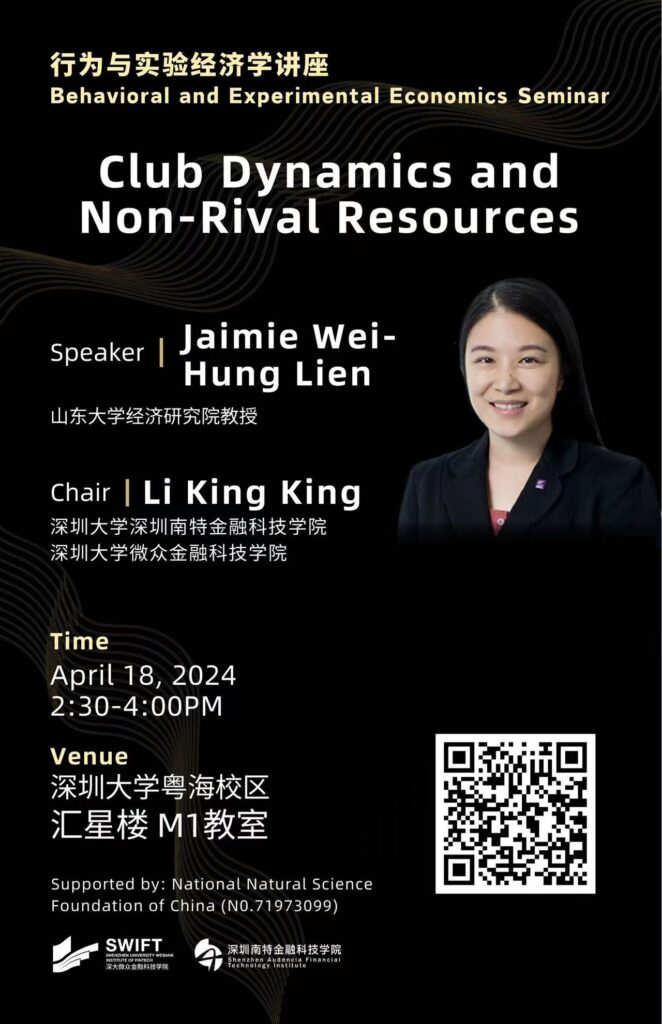
Abstract: We consider a dynamic Club Goods Game in which each player can include and/or exclude other players into their personal club, and potentially make contributions to their club which will benefit all their club members. To understand the reciprocity dynamics behind club membership and contributions, we implement four experimental treatments which vary based on whether club members can be invited, excluded, both or neither. We find that contributions are highest, and club size is most stable, under the most flexible membership determination procedure. The ability to permanently exclude members from one’s club induces the greatest reciprocal behavior among players, which is a key determinant of contributions. In addition, we examine how prior experience in the Club Goods Game affects subsequent contributions in a standard Public Goods Game. Experience in the flexible membership Club Goods Game treatment leads to the highest contributions in the Public Goods game, while fully inflexible membership produces the lowest contributions. Altogether, our study helps pinpoint the group and individual level dynamics for effective provision of non-rival resources.
Bio: Jaimie Wei-Hung Lien,山东大学经济研究院教授、博士生导师,山大特聘教授。美国卫尔斯利女子学院学士,美国加利福尼亚大学圣地亚哥分校硕士、博士。担任North American Journal of Economics and Finance等多份国际学术期刊客座编辑与编委成员,担任大陆、香港、台湾、新加坡等政府科研资助机构评审专家,担任多所高校教师晋升外审专家,担任31种期刊匿名评审人,多次获评杰出评审人。研究领域包括行为经济学、实验经济学、应用微观经济学,研究主题涉及合作互惠、参照依赖、现时偏误、代表性偏误等重要行为现象。先后主持过国家自然科学基金项目、教育部科研项目、香港研究资助局项目。目前已有论文发表于Nature Communications、PNAS、American Economic Review (Papers and Proceedings)、Games and Economic Behavior等国际知名期刊。曾获”中国信息经济学2016青年创新奖”、”中国信息经济学2018青年创新奖”和”中国信息经济学2011-2015理论贡献奖”。
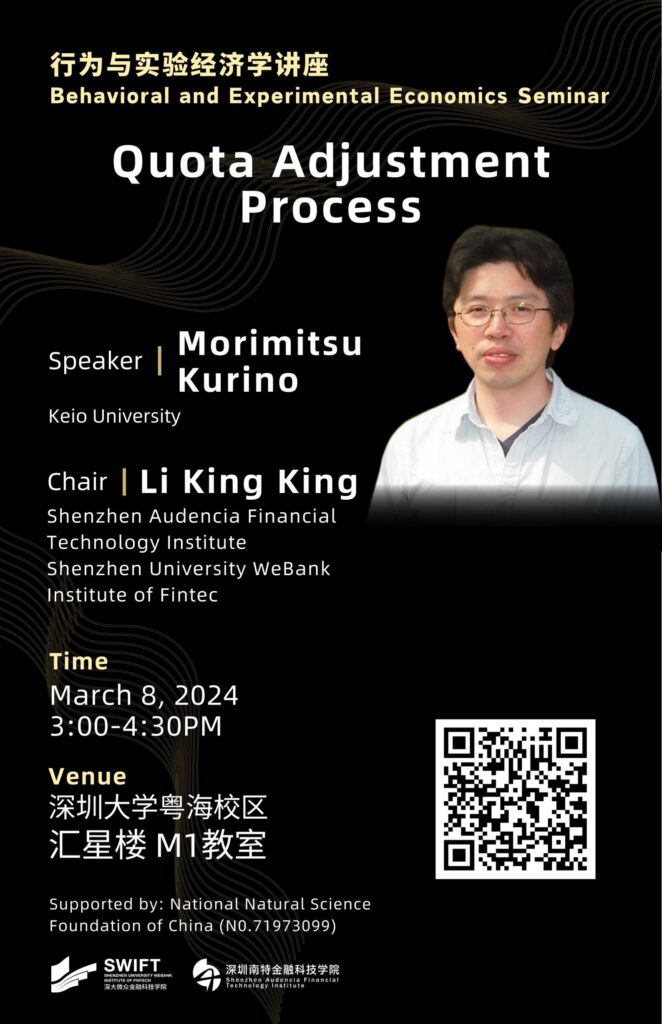
Abstract: In designing priority-based matching problems, such as school choice, the quota of each school is, to some extent, a design variable for a market designer. We define an ex-post student-optimal stable matching (ESOSM) as a matching that is stable at some implementable quota distribution, and is not Pareto dominated by any stable matching among all implementable quota distributions. A simple question is whether the total resources subject to several constraints are optimally distributed in the above sense. As optimal quota distributions vary depending on students’ preferences realized, no predetermined quota distribution is optimal for all of the students’ preferences. This requires a new matching mechanism design for the variable quota distributions. We propose the novel mechanism called quota adjustment process (QAP), which endogenously finds an ESOSM and the corresponding optimal quota distribution for any preferences and any initial quota distribution. To put this into practice, we proposed the QAP in the process of admission reform at the University of Tsukuba in Japan. Our proposal was officially approved and implemented at the University of Tsukuba in 2021.
Bio:日本庆应义塾大学( Keio University)教授。研究领域为微观经济学、博弈论、匹配市场设计、实验经济学。研究发表于经济学顶级期刊American Economic Review、Journal of Economic Theory、American Economic Journal: Microeconomics等。
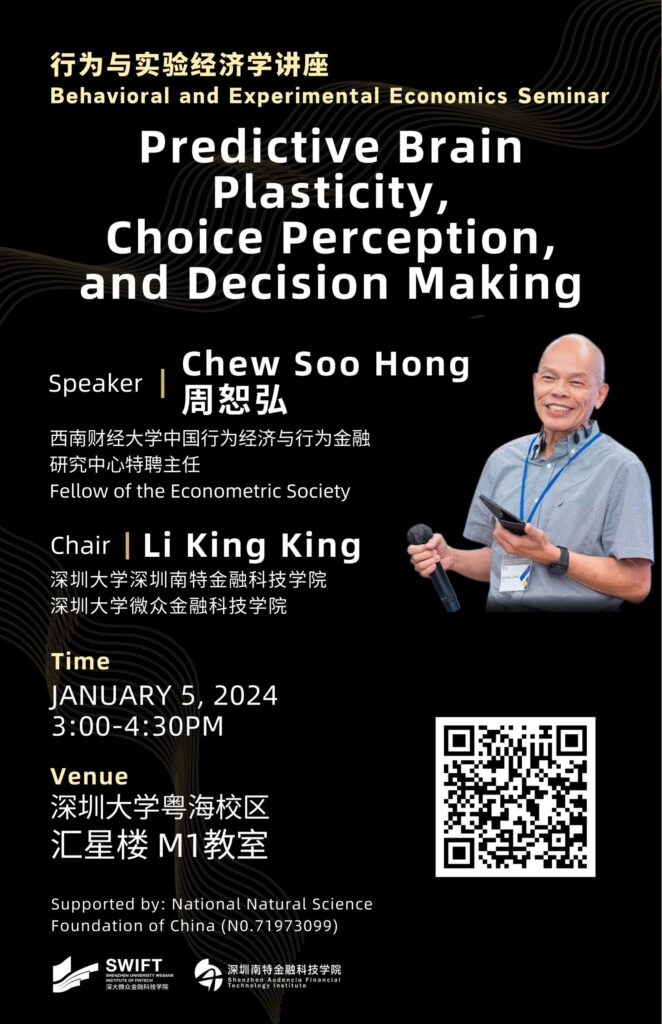
Abstract: The realization that the human brain is dynamic and constantly changing arises from the seminal work of (Hebb, 1949) which posits how synaptic connections between neurons change over time based on their correlated activity with the insightful phrase about neuronal firing – “fire together, wire together”. This Hebbian ‘learning’, reflecting the brain’s ability to change and adapt based on prior experiences, has led to the predictive brain plasticity hypothesis (Halvagal and Zenke, 2023) pointing to a mechanism which underpins the brain’s proactive tendency to seek causal understanding by anticipating future events and conditions beyond reacting to stimuli as they arise. (A tiger’s roar cannot be confused with the harmless chirp of a bird.) This capacity to anticipate sensory contingencies without being surprised is crucial for survival while minimizing energy expenditure by our miserly brain (Friston, 2010; Clark, 2013; Hohwy, 2013) which seeks accuracy by updating priors along with synaptic weights.
In situations involving risk and uncertainty, how available choices are perceived may have pivotal influence on the eventual decision and the corresponding outcomes. Building on predictive brain plasticity along with the neurochemistry of attention and valuation, we propose a neurobiological model of sensory choice perception from sensation (of stimuli) to perception of the options in a choice situation (especially the consequentialist aspects of the specific choices) through attention and memory (necessarily selective) prior to their evaluation in which cognition has a natural role. Given the inherent scarcity of attention, stimuli surviving the initial filtration are allocated attention in proportion to surprise (when error or deviation from the predictive prior surpasses a certain threshold), which is costly. This triggers the formation of a new prior modulated by a tendency to resist change called inertia. The resulting perceived choice is linked to observable decision making through an attention theory model (Chew, 1983; Chew, Wang, Zhong, 2023). We derive testable implications using for instance pharmacological intervention linking predictive brain plasticity to decision making, which delivers context dependent choice and accounts for several choice anomalies in the literature, including loss-gain framing, Allais behavior, ambiguity attitude, and source preference, from a sensory perception perspective.
Bio: Chew Soo Hong is Chief Professor (首席教授) at the Southwestern University of Finance and Economics, where he directs its China Center for Behavioral Economics and Finance. Chew is among the pioneers of axiomatic non-expected utility models and has been conducting research in the biology of decision-making. He is a fellow of the Econometric Society, which awarded him the Leonard J. Savage thesis prize, and of the Society for the Advancement of Economic Theory. Chew is an Emeritus Professor (终身荣休教授) at NUS and has previously taught at HKUST, UC Irvine, Johns Hopkins, and the University of Arizona. He has published in well-regarded journals in economics such as Econometrica, JPE, Review of Economic Studies, Journal of Economic Theory, Journal of the European Economic Association, and Journal of Economic Dynamics and Control, as well as more biologyoriented ones including Neuron, PNAS, BioMedicine & Neuroscience, and Biobehavioral Reviews, Neuroimage, PLOS ONE, and PRSB.
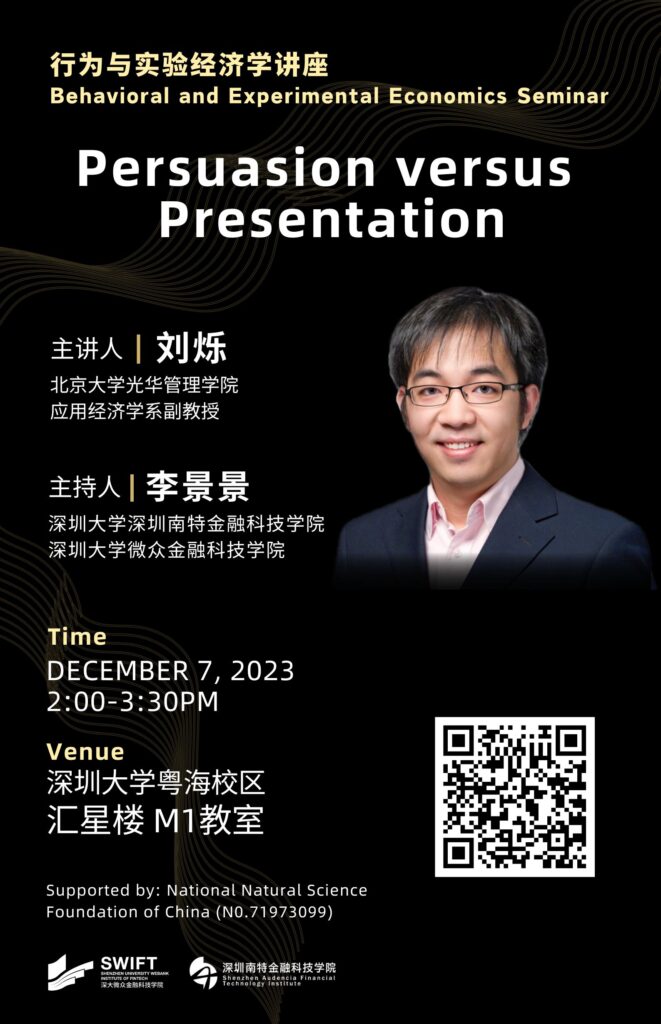
Abstract:
In many economic situations, a sender communicates strategically with a receiver not only to influence the latter’s decision-making but also to influence how certain unobserved characteristics of herself (e.g. loyalty, integrity, or smartness) are perceived. To study such strategic interactions, we introduce image-building motives into the canonical framework of Bayesian persuasion. We characterize how the sender optimally sacrifices her persuasive influence on the receiver’s decision to boost her reputation, by manipulating the communication protocol about a payoff-relevant state. Whether the receiver fares better or worse compared to the pure persuasion setting may depend on the selected equilibrium, and effects can be non-monotone with respect to the sender’s characteristics. We illustrate our findings within various classic payoff environments, for instance with quadratic losses or state-independent sender preferences. Finally, we use the model to shed new light on a wider range of applications.
Bio.:
刘烁,现任北京大学光华管理学院应用经济学系副教授。2019年毕业于瑞士苏黎世大学,获经济学博士学位。目前主要研究领域为产业与组织经济学,博弈论,以及机制设计理论。研究成果发表于国内外知名学术期刊,如American Economic Review, Theoretical Economics, Journal of Economic Theory, Economic Journal, RAND Journal of Economics, Games and Economic Behavior等。2022年入选中国信息经济学会乌家培资助计划,2023年获国家自然科学基金委优秀青年科学基金项目资助。
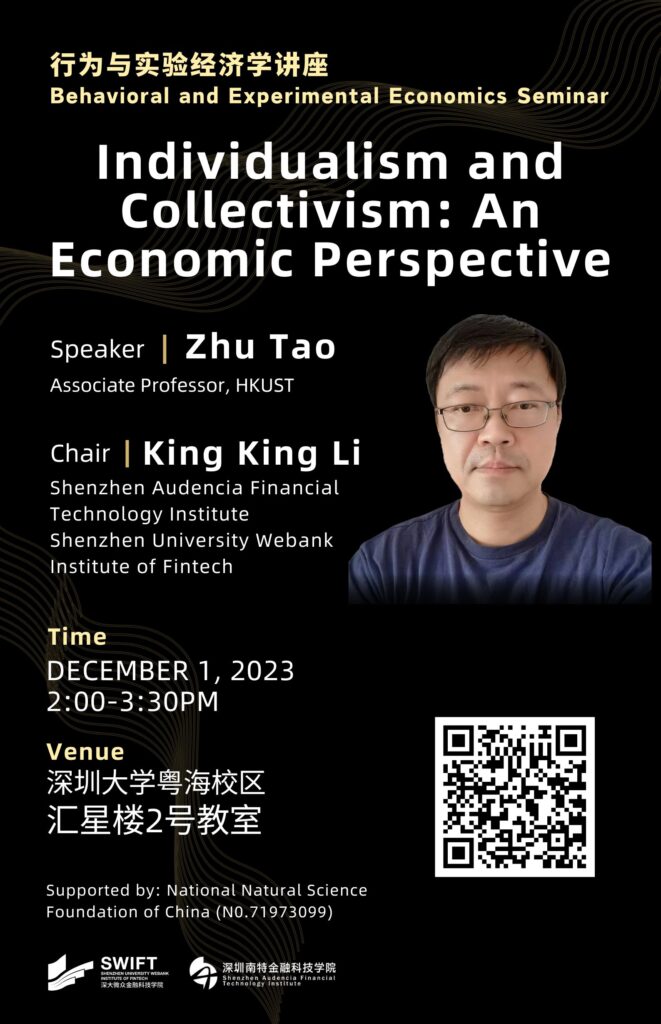
Abstract:
Individualism and collectivism are treated as bargaining norms in a new-classical growth model where capital can be more efficiently formed by bilateral cooperation than by autarky. For bilateral cooperation, there is a holdup problem because each side has to place some input before cooperation starts. When the relationship of the pre-cooperation inputs of two sides is substitutional, individualism achieves the best allocation while collectivism does not. When this relationship is complementary, collectivism achieves the best allocation while individualism does not.
Bio.:
香港科技大学副教授, 在加入香港科大前为美国康内尔大学经济系助理教授。研究领域为宏观经济学、货币经济学。研究发表于经济学顶级期刊Econometrica、Journal of Monetary Economics、Journal of Economic Theory、International Economic Review等。
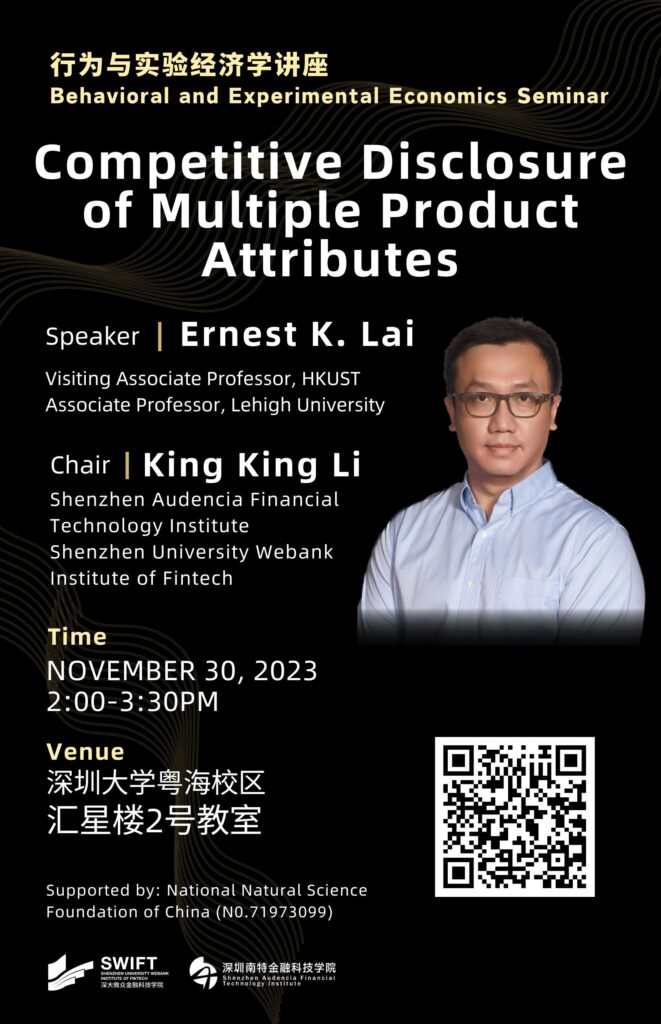
Abstract:
We analyze a duopolistic model of quality disclosure in which product differentiation can be either horizontal or vertical under two vertically differentiated product attributes. Disclosure is fully revealing in the absence of disclosure cost. When disclosure is costly, firms partially disclose. We apply the familiar economic properties of absolute and comparative advantages in a novel way to characterize partial disclosure under the multiple product attributes. The type of product differentiation and intensity of competition interact with absolute and comparative attribute advantages in determining the equilibrium non-disclosure sets of the firms. When consumers fall short of forming rational expectation after non-disclosure, firms may partially disclose even without disclosure cost, and the same properties continue to dictate firms’ disclosure behavior in the boundedly rational paradigm.
Bio.:
Professor Lai joined Lehigh University in 2009 after obtaining his doctorate from the University of Pittsburgh. A native of Hong Kong, he obtained his undergraduate and master’s degrees at The Hong Kong University of Science and Technology and The University of Hong Kong. His research focuses on using the tools of game theory and laboratory experiments to study strategic communication between parties with conflicting interests. He teaches microeconomics and game theory at the undergraduate and graduate levels.
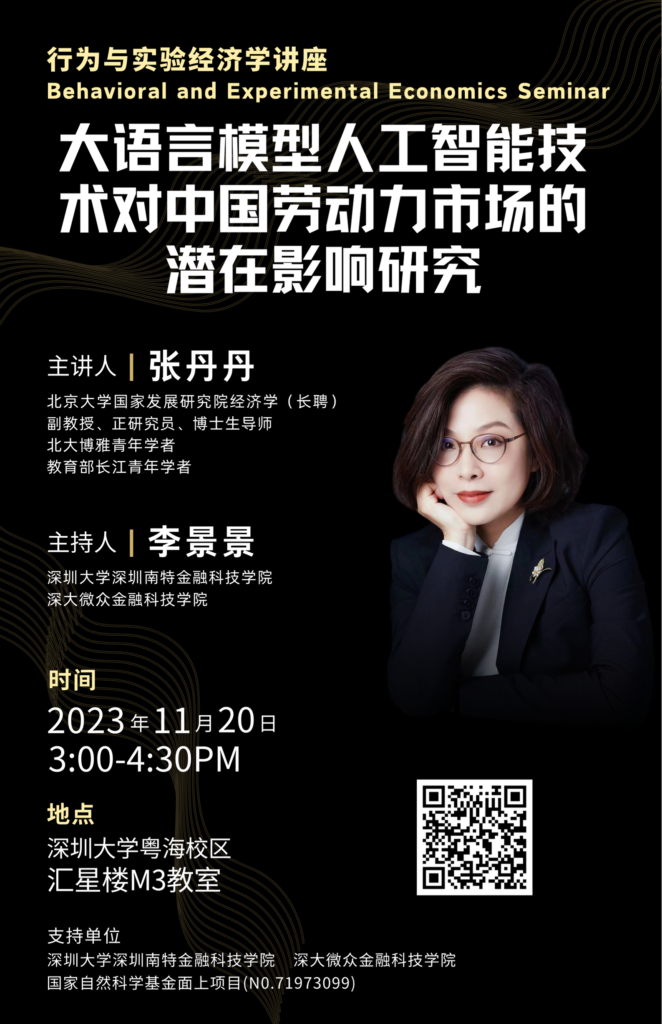
摘要:近年来,人工智能技术特别是以ChatGPT为代表的大语言模型人工智能技术迅速发展。本研究基于2018年1月至2023年4月间的102万条来自智联招聘平台的新增工作职位数据,运用文本分析技术,基于具体工作内容、任务和职业等信息,构建了大语言模型人工智能技术暴露指数,刻画了中国劳动力市场对人工智能技术的反应,分析了企业对新技术的适应性调整,并通过国际比较评估了他们在应对新技术上的表现。本文发现:过去五年,中国劳动力市场上新增职位的大语言模型人工智能技术暴露度呈现降低趋势,并在2022年之后加速下降;受冲击较大的主要是白领职业,如财会、翻译、银行业务、销售及软件互联网从业者等;尽管2021年企业对大语言模型人工智能技术的需求上升,但近两年出现下滑趋势,显示出对新技术发展的滞后反应。与其他国家相比,中国劳动力市场对新技术的适应性仍有待加强。本文建议加大对大语言模型人工智能技术的研发投入,降低应用门槛,鼓励企业和劳动者更加主动地使用新技术。
Bio: 张丹丹,北京大学国家发展研究院经济学(长聘)副教授、正研究员、博士生导师、北大博雅青年学者、教育部长江青年学者。现任北京大学国家发展研究院助理院长,主管科研工作。张丹丹毕业于澳大利亚国立大学,获经济学博士学位,研究领域为劳动经济学、应用计量经济学和实验经济学,特别关注转型期弱势群体的福利问题,以及社会变革、制度文化冲击对人行为的影响。其学术成果发表在Economic Journal,Nature:Human Behaviour,Journal of Economic Behavior and Organization,Review of Income and wealth,《经济研究》,《经济学(季刊)》等国内外经济学或一般科学类顶级期刊。近几年,她主持多项国家自然科学基金面上项目、国家社会科学基金重点项目和国家高端智库重点研究课题;曾多次作为专家组成员参与人力资源与社会保障部、国家统计局和国家疾控中心组织的专题座谈和讨论,对疫情防控政策和就业问题提供了政策建议;其研究成果形成的资政报告被中共中央办公厅、国务院和相关部委采纳。